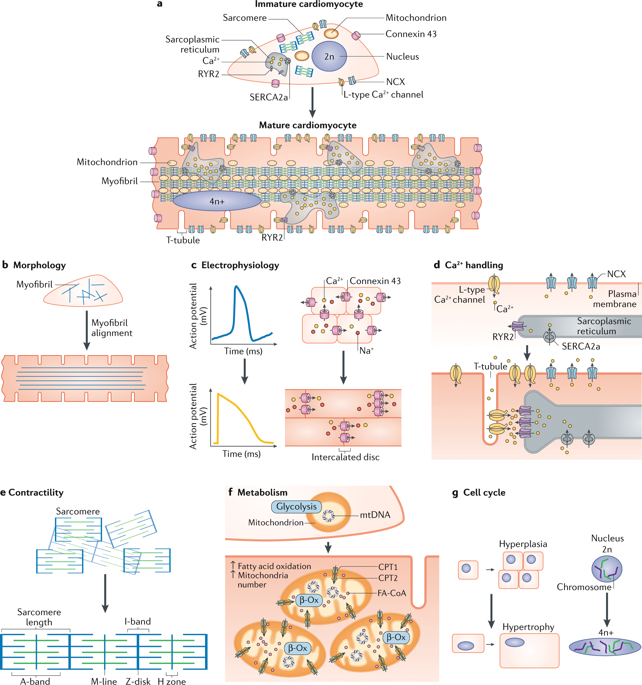当前位置:
X-MOL 学术
›
Nat. Rev. Cardiol.
›
论文详情
Our official English website, www.x-mol.net, welcomes your feedback! (Note: you will need to create a separate account there.)
Cardiomyocyte maturation: advances in knowledge and implications for regenerative medicine.
Nature Reviews Cardiology ( IF 49.6 ) Pub Date : 2020-02-03 , DOI: 10.1038/s41569-019-0331-x Elaheh Karbassi 1, 2, 3 , Aidan Fenix 1, 2, 3 , Silvia Marchiano 1, 2, 3 , Naoto Muraoka 1, 2, 3 , Kenta Nakamura 1, 2, 4 , Xiulan Yang 1, 2, 3 , Charles E Murry 1, 2, 3, 4, 5
Nature Reviews Cardiology ( IF 49.6 ) Pub Date : 2020-02-03 , DOI: 10.1038/s41569-019-0331-x Elaheh Karbassi 1, 2, 3 , Aidan Fenix 1, 2, 3 , Silvia Marchiano 1, 2, 3 , Naoto Muraoka 1, 2, 3 , Kenta Nakamura 1, 2, 4 , Xiulan Yang 1, 2, 3 , Charles E Murry 1, 2, 3, 4, 5
Affiliation

|
Our knowledge of pluripotent stem cell (PSC) biology has advanced to the point where we now can generate most cells of the human body in the laboratory. PSC-derived cardiomyocytes can be generated routinely with high yield and purity for disease research and drug development, and these cells are now gradually entering the clinical research phase for the testing of heart regeneration therapies. However, a major hurdle for their applications is the immature state of these cardiomyocytes. In this Review, we describe the structural and functional properties of cardiomyocytes and present the current approaches to mature PSC-derived cardiomyocytes. To date, the greatest success in maturation of PSC-derived cardiomyocytes has been with transplantation into the heart in animal models and the engineering of 3D heart tissues with electromechanical conditioning. In conventional 2D cell culture, biophysical stimuli such as mechanical loading, electrical stimulation and nanotopology cues all induce substantial maturation, particularly of the contractile cytoskeleton. Metabolism has emerged as a potent means to control maturation with unexpected effects on electrical and mechanical function. Different interventions induce distinct facets of maturation, suggesting that activating multiple signalling networks might lead to increased maturation. Despite considerable progress, we are still far from being able to generate PSC-derived cardiomyocytes with adult-like phenotypes in vitro. Future progress will come from identifying the developmental drivers of maturation and leveraging them to create more mature cardiomyocytes for research and regenerative medicine.
中文翻译:

心肌成熟:再生医学的知识和意义。
我们对多能干细胞(PSC)生物学的了解已经发展到现在可以在实验室中生成人体大多数细胞的地步。PSC衍生的心肌细胞可以常规方式高产,高纯度地用于疾病研究和药物开发,这些细胞现在正逐步进入临床研究阶段,以测试心脏再生疗法。然而,它们的应用的主要障碍是这些心肌细胞的未成熟状态。在这篇综述中,我们描述了心肌细胞的结构和功能特性,并提出了成熟的PSC衍生的心肌细胞的当前方法。至今,PSC衍生的心肌细胞成熟的最大成功是在动物模型中进行了心脏移植以及通过机电条件对3D心脏组织进行了工程改造。在常规的2D细胞培养中,生物物理刺激(例如机械负荷,电刺激和纳米拓扑线索)均会引起大量的成熟,尤其是收缩性细胞骨架的成熟。代谢已成为控制成熟的有效手段,并对电气和机械功能产生了意想不到的影响。不同的干预措施会诱导成熟的不同方面,这表明激活多个信号网络可能导致成熟的增加。尽管取得了长足的进步,但我们仍然无法在体外产生具有成人样表型的PSC衍生的心肌细胞。
更新日期:2020-02-03
中文翻译:

心肌成熟:再生医学的知识和意义。
我们对多能干细胞(PSC)生物学的了解已经发展到现在可以在实验室中生成人体大多数细胞的地步。PSC衍生的心肌细胞可以常规方式高产,高纯度地用于疾病研究和药物开发,这些细胞现在正逐步进入临床研究阶段,以测试心脏再生疗法。然而,它们的应用的主要障碍是这些心肌细胞的未成熟状态。在这篇综述中,我们描述了心肌细胞的结构和功能特性,并提出了成熟的PSC衍生的心肌细胞的当前方法。至今,PSC衍生的心肌细胞成熟的最大成功是在动物模型中进行了心脏移植以及通过机电条件对3D心脏组织进行了工程改造。在常规的2D细胞培养中,生物物理刺激(例如机械负荷,电刺激和纳米拓扑线索)均会引起大量的成熟,尤其是收缩性细胞骨架的成熟。代谢已成为控制成熟的有效手段,并对电气和机械功能产生了意想不到的影响。不同的干预措施会诱导成熟的不同方面,这表明激活多个信号网络可能导致成熟的增加。尽管取得了长足的进步,但我们仍然无法在体外产生具有成人样表型的PSC衍生的心肌细胞。



























 京公网安备 11010802027423号
京公网安备 11010802027423号